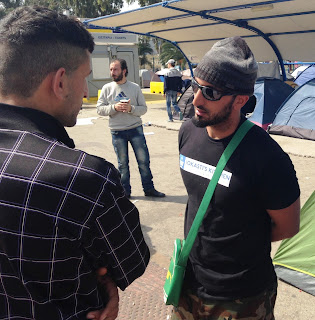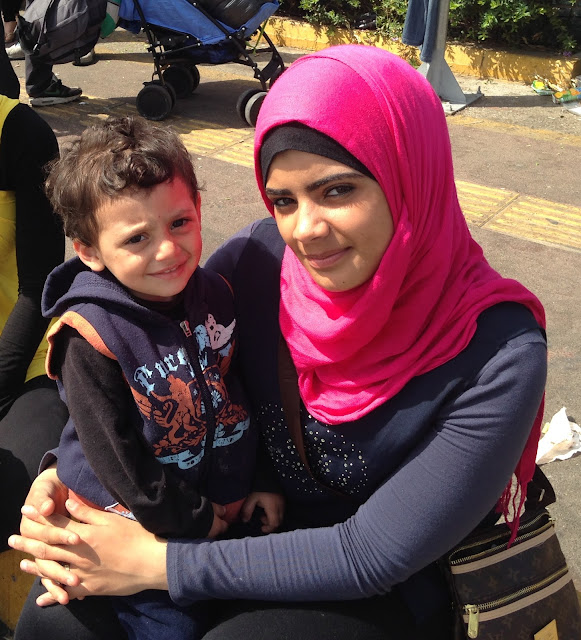Two new volunteers appeared at our store-room this morning: a girl from Denmark and another from Switzerland. They had been working on a project on Lesvos, and most of their group had transferred the operation to Athens where the need has been increasing.
 |
| Busy kitchen |
For Iokasti’s Kitchen, feeding 1,500 people on a daily basis demands a substantial volume of prepared vegetables, and I set the two girls on carrots and potatoes while I continued with my daily task of peeling, slicing and chopping my way through a 25kg sack of onions.
The task is self-imposed since when I had my restaurants in the 80’s I learned the trick of Onions without Tears and can quite happily plod on with my three knives (one for splitting, one for slicing and one for chopping) filling two huge plastic buckets with about 11kg each of prepared onion, ready to be incorporated in a stew, a soup, a rice dish or whatever Neezo decides to put on the menu that day.
Neezo is the driving force behind the operation, a Swansea-origin Welsh Muslim of Libyan extraction, closely supported by his two henchmen, Vlad Y Mir and Al, - a Romanian and a Turk – two gently spoken individuals who quietly get on with whatever needs to be done. Then there’s Sam (he’s English,) who learned volume catering at music festivals and a platoon of irregulars who float between a variety of projects at different locations around Athens.
 |
| Out with the van, evening meal in Victoria Square |
When they are not working in our kitchen operation, they might be tackling anything with other groups, from erecting facilities at detention centres to running English Language courses or organising creative workshops and playgroups for the hundreds of child refugees to be found around Athens.
Every one of us has paid our own fare to get to Greece, and pays our own way once we’re here, either by sharing with other volunteers or by finding a hostel or other alternative accommodation, and we usually eat the same as whatever we’re preparing for the refugees, as long as there is enough to go round.
Why do they do it?
Whenever someone new appears on site, I always ask the same question: “WHY?” – and I rarely get a straightforward answer. Nobody wants to appear sanctimonious, but the reality is that most of the volunteers I speak to are altruistic and believe they can make a practical contribution towards alleviating a tragic situation that stems from the actions of the West in its involvement in disturbances in Iraq, Afghanistan and Syria. This blog is not the place to debate the veracity of that statement, but it is the place to consider how volunteers are contributing to dealing with the damage that has been done by destruction of people’s homes and livelihoods in these countries. These events have made thousands homeless and created widows and orphans whose future is bleak and unknown.
 |
| Neezo's mum helping out with distributing meals |
All of us who volunteer are dismayed by the actions (-or lack of actions) of our governments, the European Union and the United Nations.
 |
| The Pope's visit was a welcome intervention |
We see no leadership from any quarter. The visit of Pope Francis was a glimmer of encouragement, but it was carefully stage-managed to minimise the opportunity for any communication between the volunteers and the Vatican visitors.
Would you consider volunteering?
When most people consider volunteering to work in a foreign country, they think about an established organisation like VSO [voluntary service overseas] Médecins Sans Frontierès, or one of the faith-based charities like Christian Aid or Samaritan’s Purse. Such organisations are efficiently structured and organised to provide a framework for the individual’s contribution to a project. However, working with refugees and migrants in Greece is a very different set-up. In fact, there is virtually no “set-up;” it’s all largely ad-hoc and random, constantly adjusting to changes in the local situation and endeavouring to keep up with the challenges that crop up from day to day.
It all starts with Facebook – which will immediately alienate all those baby-boomers for whom Facebook, blogs and eBay are hazardous mysteries suspected of disseminating dangerous viruses that might – at a stroke – destroy your irreplaceable collection of photographs of children’s weddings and grandchildren’s birthday parties.
Facebook is the “Social Network” where the groups share news based on their own experiences, and in a world where oligarchs control the media, Facebook is often the place to follow what is really happening in the world, rather than what the mainstream media choose to tell you.
 |
| The Facebook page for our group |
Volunteer projects set up their own Facebook Page, where members share their news and where other people – from around the world – add their comments and encouragement. Very occasionally there are negative remarks, but by and large Facebook fuels the energy and enthusiasm of volunteers everywhere. It is also an outlet for their anger when governments take actions that are blatantly political gestures – such as the overnight paint-job on the reception centre in Lesvos prior to the Pope’s visit. Similarly, it is a forum for the ongoing debate over the EU : Turkey deal that is currently resulting in much hardship, confusion and suffering for people who have already lost their homes and their livelihoods.
Updates from volunteer groups on Facebook will tell you what is, and is not, needed, and if you want to take things further you can easily make contact through the PM (Private Message) system. What got me going was a photograph on Facebook of someone trying to chop up onions in a catering project, and the general comments about floods of onion-invoked tears. I told them I did not cry when I peel and chop onions and asked if I could help . . . . and the rest, as they say, is my developing story.
Staying Anonymous
Once you are “on” Facebook, you can remain more or less anonymous. I helped a very supportive friend in her eighties to join Facebook with an assumed name and without revealing any personal contact details. I am her only “Facebook friend,” but that gives her access to everything I share and has enabled her to feel very much involved in what is going on and what I am doing. Without her generous financial contribution and her constant encouragement, I could not be here today.
Could you be a volunteer?
With a little bit of research, you will discover projects that could present an opportunity for you. A major part of your contribution will be a smile and a few cheerful words, the very things that are missing in a situation that is increasingly controlled by paramilitary police and the blundering interference of the European Union.
There is a real need for people who are able to commit to four weeks or more, but there is always a welcome for the tourist volunteer who takes a weekend break and brings a suitcase of specific, much-needed items or a cash donation collected by the local community in UK. Whether you come for a week or a month, you will almost certainly have to find your own accommodation, and the situation varies wherever you choose to go. I originally chose Samos because of the need for kitchen help, and the fact that there was accommodation provided for long-term volunteers. When the operation transferred to Athens, I changed my plans. I booked a cheap hotel for a few days and asked around if anyone knew of a vacant flat. I was very lucky and have a 3-month let on a tiny apartment on top of a housing block. My room opens onto a flat roof with a view across to the Acropolis on the horizon. This is surely an added bonus!
So, if you want to help, you are giving your time and you are supporting yourself both in terms of getting to Greece and in terms of somewhere to stay. The bonus of working in the soup-kitchen is that you won’t go hungry, but in any case, good food is available in simple, cheap restaurants.
On a philosophical note. . .
As far as I am concerned, there is only one true reason for being in Greece, Calais, Dunkirk or any of the refugee camps along the route: it is to be on the right side of history. I want my grandchildren to know that I decided to get involved and play my part; I want to set an example of putting beliefs and ideals into practical action, and I want them to remember that, when they are faced with the opportunity to take a stand at a moment in history.
I do not wish to sound pretentious, but I want to make some contribution to try and improve the situation of refugees in Europe. In the words of the 20th-century martyr Dietrich Bonhöffer:
- Silence in the face of evil is itself evil. God will not hold us guiltless. Not to speak, is to speak. Not to act, is to act.
If you want to contribute to supporting our operation feeding refugees, you can donate to Iokasti's Kitchen through this website (originally for Samos, now for Athens). Every penny I receive will go to food, gas or kitchen requirements.
https://www.gofundme.com/Samos-Refugees

































